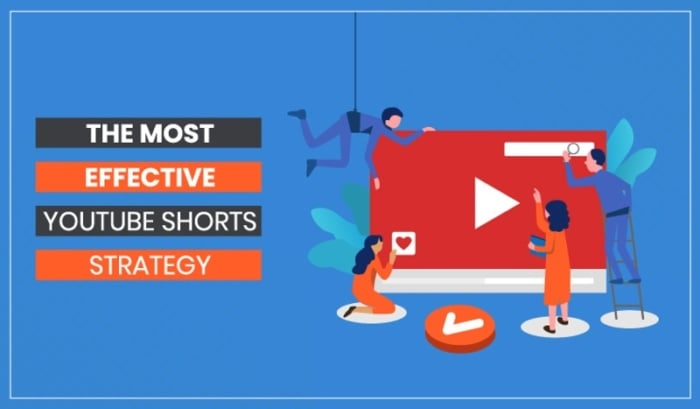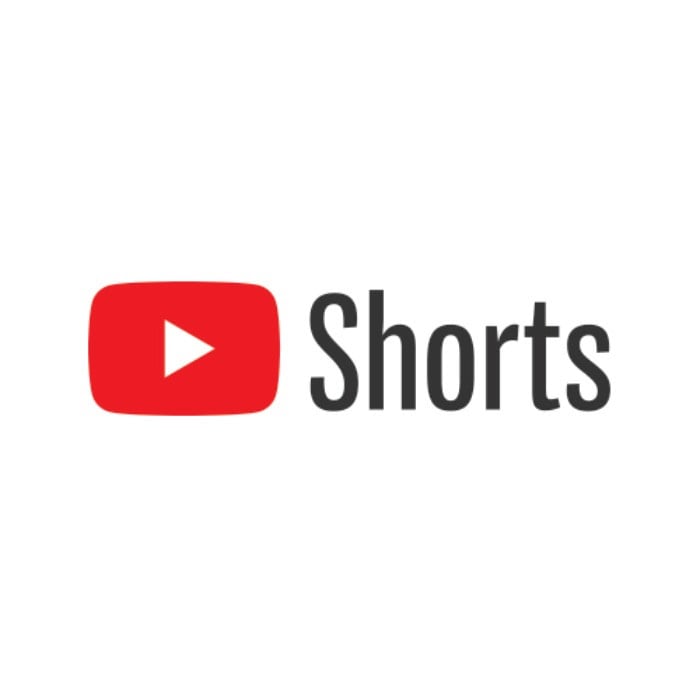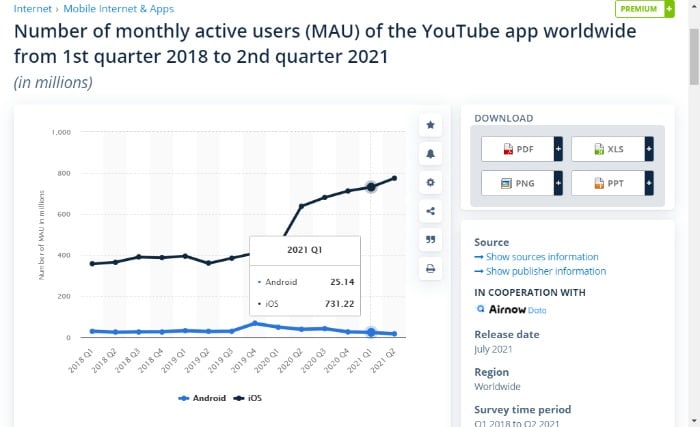
It looks like short-form video content is here to stay.
With platforms like Instagram Reels, TikTok, and Vine gaining vast and often viral audiences, it seems consumers can’t get enough of it. Then came Google’s response to the rising trend: YouTube Shorts.
Bite-sized content has been gaining ground for a while now and HubSpot Academy expects to see a trend towards more user-generated content, behind the brands, and explainer/educational videos.
A Digital Marketer for HubSpot Academy, Brandon Saunders, theorized that the growing use of social media (and which content types gain traction) reveals how consumers’ attention spans are getting shorter over time.
That means marketers and businesses must adapt and add more concise content to their plans.
What Are YouTube Shorts?

Google first introduced YouTube Shorts in India. In a press release, Chris Jaffre, VP of Product Management, said it was for creatives who wanted to “shoot short, catchy videos” just using their mobiles.
YouTube Shorts in India are a runaway success, and viewership is soaring globally. In early 2021, YouTube announced a beta launch for the U.S. and promised plenty of newer features, including a growing music catalog and further visibility.
Much like Instagram Reels and TikTok, these short videos give viewers an easy way to digest one topic through snappy animations, music video parodies, documentary shorts, and brand content.
What Are the Benefits of YouTube Shorts?
Of all the short-form video platforms, why would you choose YouTube Shorts over any of the others? After all, it does lack some features that the likes of TikTok and Reels have. That doesn’t mean it hasn’t got plenty in its favor, though, such as:
- You don’t need much equipment: There’s no need for a laptop or desktop computer. All you need is a smartphone, and you’re good to go.
- You can create accessible content: Provide viewers with digestible content they can consume on the move.
- Convenience and ease of use: Upload multiple videos all at once and add captions.
- Huge potential audience: YouTube has 774.6 million active users just on iPhone and iPad.

What’s the Difference Between YouTube Shorts, TikTok, and Instagram Reels?
To simplify things, let’s break it down into three sections: length, features, and demographics for each channel.
Length
Shorts are a minute long, maximum. If you’re using the YouTube App, you’ve only got 15 seconds.
Instagram Reels has a 1-minute limit, regardless of whether the video is uploaded or recorded.
TikTok has a 3-minute time limit.
Features
YouTube Shorts
- Automatically add captions.
- Includes several creative features to enhance video creation, like speed controls.
- A multiple segment camera.
- Choose the part of the song you want.
- Color correction options and fast uploading direct from your phone’s gallery.
- Wide range of music tracks from YouTube’s catalog.
Instagram Reels
Instagram Reels allows users to create a highlight reel of their photos and videos. Users can add:
- music
- filters
- stickers
- captions
- location tags
Additionally, they can include a caption at the beginning or end of the video/photo.
Other features include AR effects, timer, and countdowns.
TikTok
- Choose from pre-made videos or make your own with just a few taps.
- Discover trending content from around the world and nearby, all in one feed.
- Share your video on Instagram, Twitter, or Facebook after you post to enjoy it on another platform.
- Video Editor and Live Video.
Demographics
YouTube appeals to the 15-25-year-old demographic but is also enormously popular among 26-35-year-olds.
Instagram attracts the 25-34-year-old audience, while TikTok is most attractive to 16-24 year-olds.
Tips and Strategies for Creating Effective YouTube Shorts
Consumers want accessible consumer content, which they can watch on the go. As discussed in the intro, this has led to a trend in short-form video, with Reels, TikTok, and more recently, YouTube Shorts.
Even though they’ve only launched recently, and the platform is only available in India and the United States, there are 15 billion daily views.
However, like any other platform, if you’re going to optimize your success and attract your share of viewers, you need to implement effective strategies.
1. Keep Your Videos to an Appropriate Length
Consumers’ attention spans are declining, meaning you’ve got less chance to capture their interest and a limited amount of time to convey your message. That means keeping your video to the appropriate length while still saying everything you want to.
How do you keep videos short and sweet? Well, you can:
- Get straight to the point. You can do this even with complex subjects. If necessary, break longer topics into sections and create a series.
- Tailor the clip to the platform: ensure it’s the correct ratio and that the content works for your specific audience.
- Start with an attention-grabbing line, followed by a story to keep the viewer hooked for the duration of the video.
- Avoid having too many people talking in one video or too much going on.
- Limit on-screen clutter.
- Create thumbnails: if you’ve going to stand out on YouTube, you need captivating thumbnails to grab viewers’ attention.
2. Understand the Tone That Appeals to Your Target Audience and Create Videos Accordingly
As with any of your other content, you must understand the tone that appeals to your audience. Is it demonstrative, enthusiastic, or informative?
Some brands use YouTube Shorts as how-to videos or for comedic purposes. Popular channels include CollegeHumor or Funny Or Die, which has millions of subscribers.
When creating content, you should already have some idea of the tone that works. Make that your starting point.
If you’re new to this and not sure, you can:
- Ask yourself who your target audience is. There are six key questions to determine this.
- Now decide what you want to achieve. Do you want to educate? Make people laugh? Inspire?
- What do you want the content to do for your business?
- You can then begin creating a video content strategy, including SEO, optimization, content promotion, and analyzing performance.
3. Optimize the Titles of Your YouTube Shorts
Title optimization is the process of creating the best possible title for your videos. It’s an integral part of how your visitors find you in the YouTube search engine and helps the site’s algorithm discover your content.
Here’s how to optimize your titles:
- Research keywords. You can use the Ubersuggest tool for this.
- Use hashtags. YouTube recommends you include #shorts in your description, so its system can recommend them to viewers.
- Limit characters to 50-70.
- Overlay titles onto captions.
4. Create Custom Thumbnails for Your Shorts
OK. I’m going to be straight with you: there’s no default feature for adding custom thumbnails to YouTube Shorts. Usually, you see a randomly selected clip next to your title. However, there are some hacks to get around it.
There are variations, but it comes down to this:
- Select a frame from the video that represents what it’s about.
- Anticipate the screengrab YouTube.
- Use various editing tools to customize the look of the image by changing its color, adding text or shapes, inserting effects, or cropping it.
- Download your new thumbnail image in high-resolution by clicking on “Download” in the lower right corner of your screen.
- Upload it to YouTube.
You can also create custom thumbnails with Canva or alternative social media tools.
5. Repurpose Your Content
Video content has become an increasingly popular medium to share stories and connect with a broader audience. It has also become an integral part of the social media marketing strategy for many companies. You can make your YouTube Shorts content go even further by repurposing it.
For example, you could:
- Develop your video into a longer blog post.
- Create an infographic and share it on social media.
- Share YouTube Shorts content on sites like Facebook or Twitter.
- Add your content on Instagram Reels.
6. Add Value
To add value, make each video with your audience in mind. Understand them. The problems they face, and how you can help them. Then:
- Share a takeaway they can apply to their everyday lives.
- Motivate and inspire your audience.
- Tell them something they don’t know about your business.
- Give them something new to think about or something they can relate to in their own life.
- Focus on developing the type of content that resonates with them.
However, you also need to ask yourself how the content adds value to your brand. What results do you want from your videos? More engagement? More sign-ups? Find the sweet spot between what adds value for your audience—and also for your business.
7. Create Relevant Content
Again, this comes down to understanding your audience so you can give them the kind of content they want to see.
If you’re just finding your feet, you can determine this by:
- Speaking to your current customers about the everyday problems and asking them what they want to see.
- Drawing up your target audience and creating a content plan around them.
- Watching Shorts from other brands and viewing responses, viewing figures, etc.
To achieve a wider reach, you can also:
- Create newsworthy content. Base your content around events, trends, new surveys, and what’s happening on social media.
- Integrate keywords. Understand the search terms your views are likely to use to find your content.
- Answer the questions people are asking. A tool like AnswerhePublic is perfect for this. Here are the results for “chocolate.”

YouTube Shorts Frequently Asked Questions
Are YouTube Shorts monetized?
YouTube recently introduced financial incentives via its YouTube Monetization Fund. The Fund consists of $100 million.
The plan is to reward contributors who get the most engagement and views; YouTube plans to contact anyone who qualifies for payment and seek feedback from its community regarding financial rewards.
Additionally, YouTube states the fund is the first step towards monetization, and there are plans to introduce ads for the Shorts format to test response.
Should you create Shorts, TikToks, or Reels?
It depends entirely on the audience you’re aiming for. Think of the demographics and where your typical customer hangs out.
To get the most from your content, you could always reuse your content on multiple sites and measure performance.
Should you create regular YouTube Videos and Shorts or pick one type?
There are many reasons why someone might want to post on both channels. Try out both of them and see what works best for them and their audience.
Don’t be scared to diversify and monitor what works well for your particular audience.
Is there a YouTube Shorts app?
Yes. YouTube Shorts uses an app that provides an easier way to find and watch videos by allowing you to search for them by topic.
You can reach a new audience by accessing the YouTube app via your smartphone, making short video content even easier.
YouTube Shorts (aka Shorts YouTube) Conclusion
As the success of TikTok and Instagram Reels shows, consumers want bite-size content they can engage with and watch on the go.
Shorts are Google’s answer to this trend, and there are several strategies you can implement to get the best from the platform.
Creating relevant content, optimizing your titles, and creating concise content are just some of the ways you can increase subscribers and engagement.
Do you use YouTube Shorts? Tell us about your experience.
from Blog – Neil Patel https://ift.tt/3GL7kZR
via IFTTT
No comments:
Post a Comment